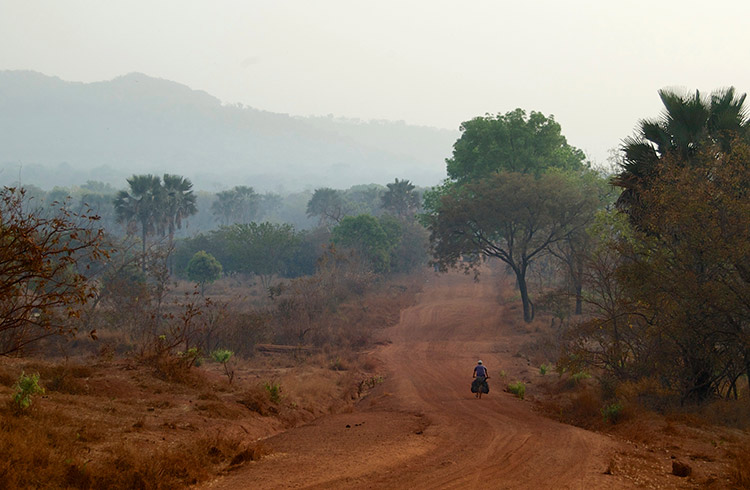Immunizations for Guinea: Travel Health Tips
Diseases, health issues and hygiene problems may ruin your trip to Guinea. Find out how to be prepared and stay healthy on your trip.
 Photo © Getty Images/Maarten Van De Biezen / EyeEm
Photo © Getty Images/Maarten Van De Biezen / EyeEm
The Bamako Initiative of 1987 promoted community-based methods of increasing accessibility to drugs and health care services for all citizens, partly by implementing user fees1. Despite this well intended initiative, years of autocratic rule, entrenched corruption and poor governance have ensured that health care remains at best rudimentary.
Medical facilities are poor, equipment is basic and rarely maintained under sterile conditions. Common drugs readily available in the first world are often in short supply. There are no central contact numbers for hospitals in Guinea. Only private clinics e.g. the Clinique Pasteur in Conakry - can be contacted. There are minimal facilities for dealing with heart problems and major trauma. For serious medical treatment, medical evacuation to Europe is necessary.
With such conditions on the ground, it's no wonder governments suggest that if their citizens travel to Guinea, they take out comprehensive travel insurance that will cover any overseas medical costs, including medical evacuation, before they depart.3 The Australian Government warns that each year it handles over 25,000 cases involving Australian citizens in difficulty overseas. This includes over 1,200 hospitalisations, 900 deaths and 50 evacuations for medical purposes.
A prerequisite for entry to Guinea5 is a valid Yellow Fever Vaccination Certificate. This highlights the fact that Yellow Fever outbreaks occur regularly in Guinea6 and the government is doing its utmost to prevent the spread of the disease.
In the interest of personal safety, all travellers to Guinea should be vaccinated against Hepatitis A and B, Typhoid Fever, Miningococcus, Polio, Rabies, Measles-Mumps- Rubella (MMR) Tetanus-diptheria and, of course, Yellow Fever.
Hepatitis A, C and E are widespread in Guinea. Hepatitis B is hyperendemic.
Cholera outbreaks have occured throughout the last decade: there were 4,000 cases during the first 8 months of 2007, including 135 deaths. Most outbreaks are related to contaminated drinking water, and typically arose in situations of extreme poverty. Most travellers who observe the basic food and water precautions, are at extremely low risk for infection.
Diarrhoeal diseases, including giardiasis, and typhoid fevers are common. Schistosomiasis (Bilharzia) is also present.
Schistosomiasis is a parasitic disease caused by several species of trematodes (platyhelminth infection, or "flukes"), a parasitic worm of the genus Schistosoma. Although rarely fatal schistosomiasis may become chronic. This can damage internal organs and, in children, impair growth and cognitive development. The urinary form of Schistosomiasis is associated with increased risks for bladder cancer in adults. It is the second most socioeconomically devastating parasitic disease after malaria.
Schistosomiasis is contracted through bathing, swimming, paddling or engaging in water sports, especially in bodies of still fresh water such as sluggish streams or lakes. The risk is reduced when bathing in flowing water Well maintained swimming pools, adequately chlorinated are quite safe.
Onchocerciasis (river blindness) is the world's second leading cause of blindness. It is a parasitic disease caused by a parasitic worm (Onchocerca volvulus) that can live in the human body for up to 14 years. The larval forms of these parasitic worms are introduced in the human body, as well as transmitted from a sick person to a healthy one, via the bite of infected blackflies (Simulium). Aside from being a leading cause of blindness, those infected experience severe and continuous itching due to nodules that develop under the skin, causing them to scratch repeatedly. As a result, the damaged skin areas suffer loss of pigmentation and, over the time, the skin becomes spotty, with de-pigmented spots more susceptible to skin cancer.
A possible precautionary measure is chemioprophylaxy. In 1987, ivermectine was launched under the name of mectizan. Well tolerated by patients, a single tablet taken once every six months destroys the microfilaria and inhibits the egg-laying of adult filaria.
Trypanosomiasis (sleeping sickness), a serious neurological disease spread through the bite of the tsetse fly, is also present. First mentioned from the upper Niger in the 14th century by the North African historiographer Ibn Khaldoun, the next report came from Guinea in 1734. Although only an average of 100 cases are reported annually, anyone intending to travel to the savanna regions of Guinea should wear appropriate clothing and use insect repellant. No is no vaccination against Trypanosomiasis.
Dengue Fever and TB are present in Guinea and the UNAIDS/WHO Working Group estimated that around 70,000 adults aged 15 or over in Guinea were living with HIV; the prevalence percentage was estimated at around 1.3% of the adult population. 13 Travellers should exercise the normal precautions to safeguard themselves against exposure to HIV/AIDS.
Against these many and varied diseases in a country with rudimentary medical facilities, comprehensive travel insurance that covers overseas medical costs, including medical evacuation is the best option. If you intend to spend time in Guinea's rural areas, it is recommended that you carry a comprehensive First Aid Kit.
Simple and flexible travel insurance
You can buy at home or while traveling, and claim online from anywhere in the world. With 150+ adventure activities covered and 24/7 emergency assistance.
Get a quote
No Comments